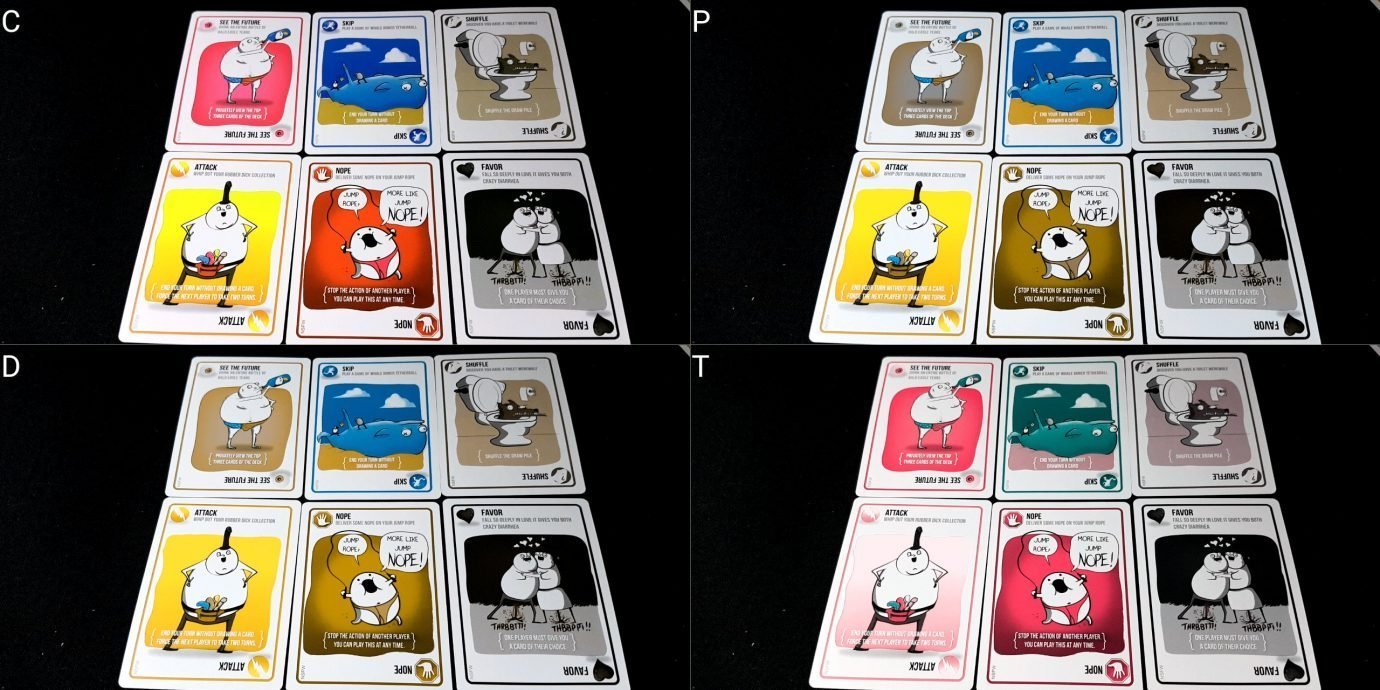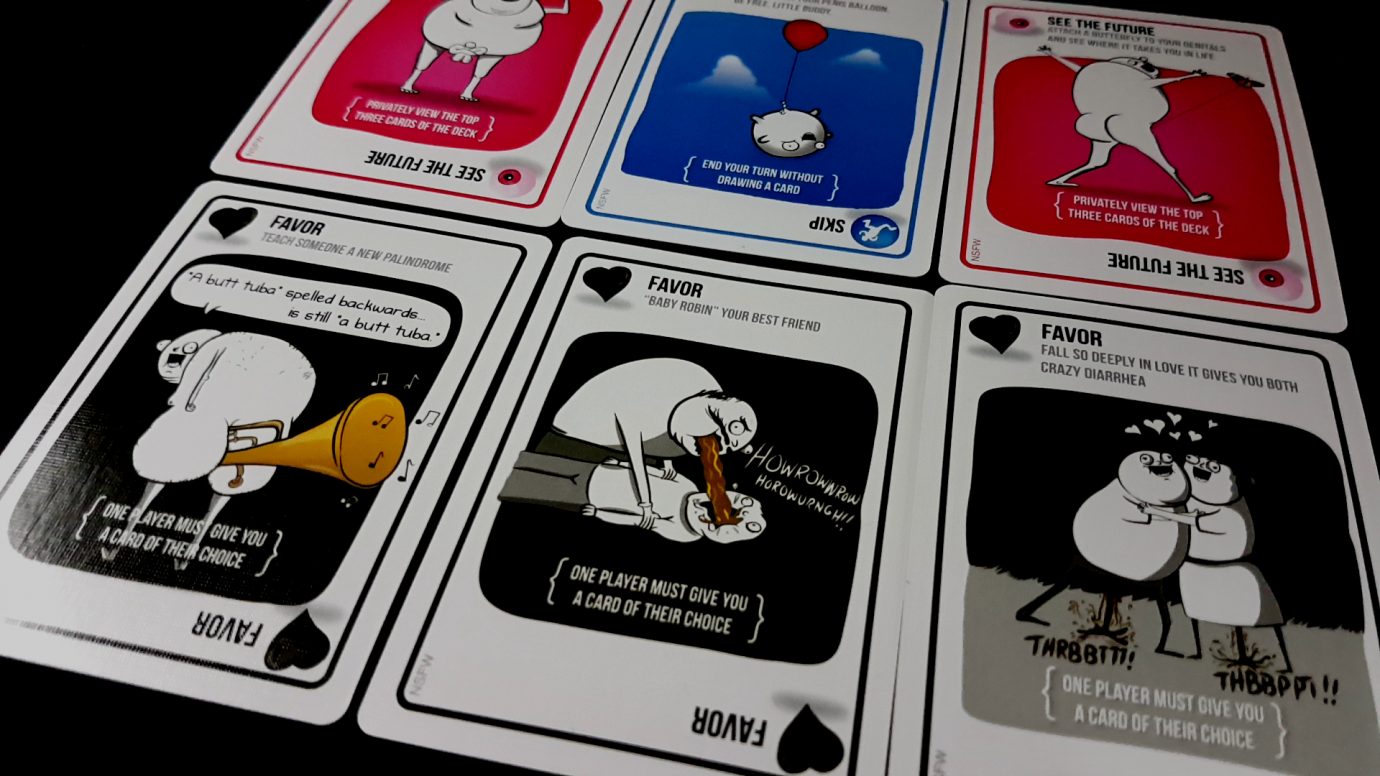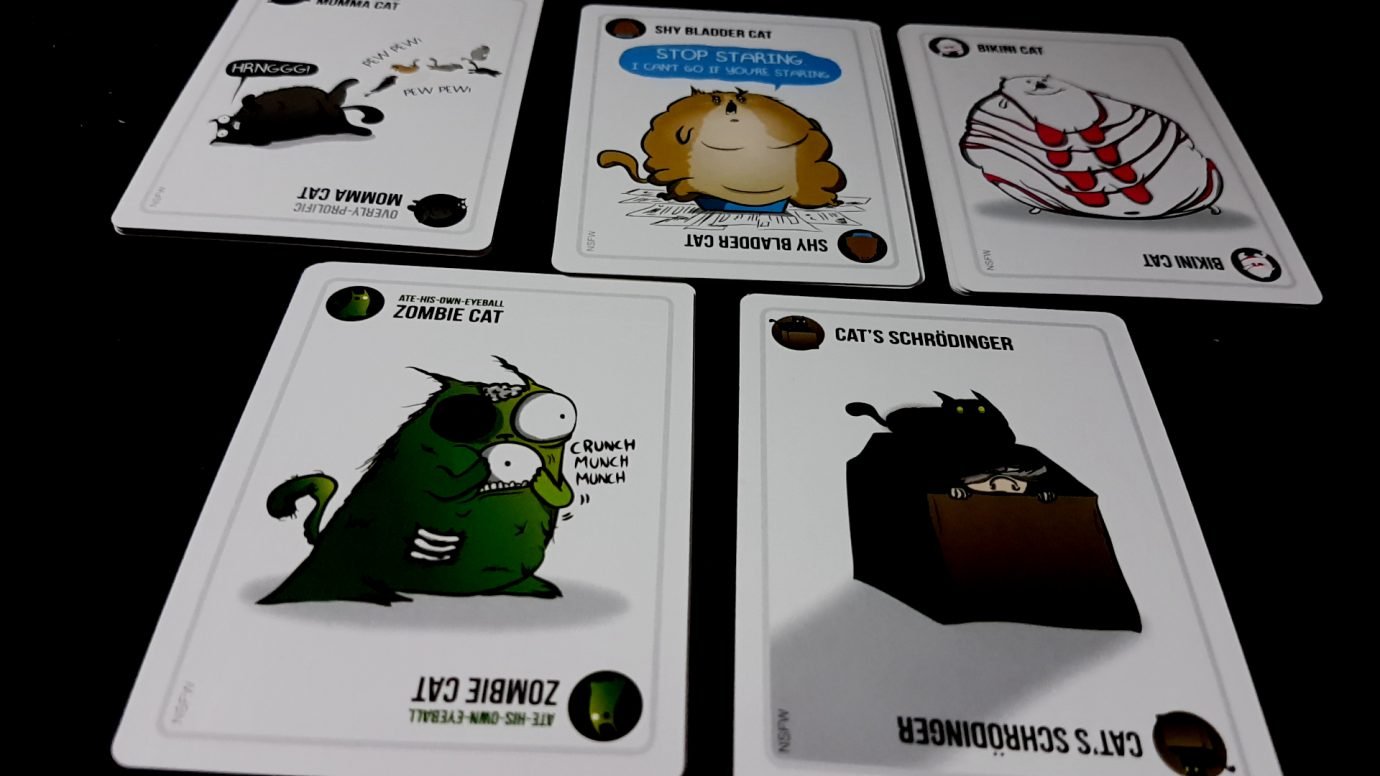Table of Contents
| Game Details | |
|---|---|
| Name | Exploding Kittens (2015) |
| Accessibility Report | Meeple Like Us |
| Complexity | Light [1.09] |
| BGG Rank | 3697 [6.06] |
| Player Count (recommended) | 2-5 (3-5) |
| Designer(s) | Matthew Inman, Elan Lee and Shane Small |
| Buy it! | Amazon Link |
Version Reviewed
Introduction
Exploding Kittens raised a sum of money more appropriate for a hurricane relief fund than a mediocre card game. We gave it two and a half stars in our review – it’s fun enough but really any joy you’ll find in the experience is likely directly related to the fact you’re simply spending time with friends. Probably. But never mind our griping – we are perpetual malcontents and cannot be made happy by any power on Earth. You’re here to find out if Exploding Kittens can be a game for you. Let’s defuse this tension with a teardown.
Colour Blindness
We’ve got a clean bill of health here – colour is used on all the cards but it is never the sole channel of information. All the cards have unique art, and prominent text and icons that can be used to disambiguate which action is which. Those that have no icon are generic cards that are to be played as pairs based on their title.

There is a degree of palette overlap that might have a slight impact on fluidity of play, but familiarity will dull even the impact of that small potential inaccessibility.

We strongly recommend Exploding Kittens in this category.
Visual Accessibility
It’s going to be necessary for a player to deal with a hidden hand of cards, and there is no tactile information available for doing that. Those for whom total blindness must be considered will likely not be able to play this game without support and modification.
Those for whom visual impairment may be less severe are going to be dependant on close inspection of a hand of cards, without any regularity to assist in identification. Each card has unique art to go with it and while this is lovely for those that enjoy the art style of Matthew Inman it’s not ideal for our purposes. Consider here our two ‘see the future’ cards and the three favour cards underneath.

The saving grace here is that if colour is a channel of information that is reliable then the background colour of the cards will help considerably in this regard. The downside is that the backgrounds are not necessarily fully consistent and this sometimes has an impact on how readable the special action text may be. There are intermittent contrast issues, and the text along the top underneath the card name is vaguely thematic gobbledygook rather than instructional.

More problematic from a visual impairment perspective is that the cards have title text that can be oriented in any direction but the actual payload text associated is only readable when the card is the ‘right’ way up. Occasional speech bubbles and ornamentations in the art might also be confusing.
However, this is an issue that will vanish with familiarity and that won’t even take long – there are only a handful of special action cards and their effects are relatively straightforward. In any case, a large print version of the effects is present in the manual provided with the game. Every other action in the game can be supported through the use of narration when playing… ‘I just played a nope card’ for example. All other information aside from what’s in your personal hand is either hidden or completely open.
We’ll recommend Exploding Kittens in this category for those with minor to moderate visual impairments, but those for whom total blindness must be considered should steer clear.
Cognitive Accessibility
At its core, Exploding Kittens is a very simple game of tossing a fizzing stick of dynamite between a group of players. Randomness by itself is enough to ensure a degree of cognitive accessibility although this can be situational. The times you want to play a ‘shuffle’ card are different from the times you want to play a ‘pass’ card and understanding the implicit probability of the deck is an important part of that. Knowing, and remembering, deck composition is also key– there’s no point hoping for a defuse card if mathematically speaking there can’t be any left.
Aside from this, there are quite a few special actions to consider:
- Exploding kittens, which must be paired with a defuse card
- Attack, which allows a player to skip and force the next player to take two turns
- Skip, which allows you to avoid drawing a card
- Favor, which forces a player to give you a card
- Shuffle, which unsurprisingly shuffles the deck
- Nope, which countermands the card someone else plays
- See the future, which lets you peek ahead in the deck
All of these need to be in play for the mechanisms of the game to work properly, and the deck you play with is sufficiently small that the effect of removing any set of cards would be disproportionately heavy. There are some special combos that can be layered in for ‘advanced play’ but they’re not necessary.
Exploding Kittens has reasonable room for strategic chains of actions and synergies of cards, but these are dependant on the flow of the game rather than the complexity of the systems. For example, if we see the future and know that there is an exploding kitten we cannot defuse it is imperative that we work out how to skip our draw. That in turn depends on how we think others are going to behave in terms of ‘nope’ cards. That’s the simplest level of the game – expecting a particular card to come out of the deck and either drawing it or not as appropriate.
On to that we layer a more sophisticated game of bluff and counterbluff. Let’s say I’m sure another player has a ‘nope’ card and I know that the next three cards to be drawn are ‘defuse, exploding kitten, bladder cat’. I might decide to just draw the defuse and hope the next player stumbles into the trap. Or, I might try to sap some resources from other players. Maybe I play my ‘skip’ card to entice someone into using that nope at a time of my choosing rather than a time of theirs.
Or perhaps I play even deeper than that. I mean, if I just faked someone into using up a nope and seemed happy enough with my card, you might think ‘Well, they wanted that top card which means that the next card is probably an exploding kitten, so I will skip’. You might really want people to use up their skip cards so that when your turn comes around again you can cheerfully draw the second defuse card that you had left there.
Now imagine everyone at the table is performing the same calculation.
The thing about this is that you don’t have enough tools in your hand to really play this kind of ‘I clearly cannot drink the goblet in front of me’ scenario out in full. Especially since the presence of ‘nope’ cards means that the machinery of your sophisticated chain of logic is prone to being dismantled from the outside. It’s something to consider in the short term though and if you want to play this game well you’ll need to do that. It’s perfectly possible to enjoy Exploding Kittens at a more intuitive level, and probably a good deal less frustrating. All I’m saying here is that there is room for tactical thinking in Exploding Kittens and I don’t want to imply it’s entirely a random guessing game.
We’ll tentatively recommend Exploding Kittens in both of our categories of cognitive accessibility.
Emotional Accessibility
Exploding Kittens is basically one big long ‘take that’ game where you’re all hoping to screw over another player by forcing them into a fail state. The presence of ‘nope’ cards in particular can result in a carefully considered set of actions failing entirely, leaving you with no option but to blunder into what you know is an inevitable failure. There are tools for mitigating the risk of the deck but those tools are imprecise, unreliable, and not entirely within your control. It’s possible to be knocked out of Exploding Kittens very early without having been able to prevent it – everyone starts with a defuse card but after that you’re on your own.
That said, this is also a game that only lasts ten or fifteen minutes and it’s explicitly a ‘last person standing’ affair. Player elimination is a major part of the game but it’s also quite fun to watch from the outside. If you’re knocked out of play it’s not as if you have to wait for an hour before you get to have fun again. Not only that, you may actually have left the game in a state that might well result in your agency being carried forward – maybe you put traps in that deck that are only going to trigger now that you’re out. There’s a great deal of cathartic vindication that comes from someone blundering into the kitten that you placed into a particular part of the deck.
However, as a ‘take that’ game there are also plenty of opportunities for players to gang up on another. Many actions (favour, playing a pair, playing a three of a kind, the nope cards) are explicitly targeted. There aren’t many reasons why a table might want to single out one other person for being the disproportionate target of aggression – after all, it’s the next and previous players that are your real worries. It’s possible though. As a result, particularly with the actions that let you take cards from someone else’s hand, you might well find that one player doesn’t get to do an awful lot on their turn. Either that or they might find their entire competitiveness robbed away by random chance. Losing a ‘nope’ or a ‘defuse’ card in particular can sting.
We’ll recommend Exploding Kittens in this category, with those caveats. In the end it’s only likely to be ten minutes per hand and inevitably those issues that aren’t specifically related to the group in which you’re playing will be smoothed out by repetition.
Physical Accessibility
The key issue here for players is going to be holding a hidden hand of cards, but card holders would be appropriate for dealing with this. There’s a small issue that goes along with the nope card, since a couple of the rules explicitly indicate there is a time consideration here. The nope cards can be played ‘at any time before an action has begun’, but the rules also say ‘Grab the pile quickly to choose your card so that you don’t get noped’ for a combo action. Rapidity of the action in other words is an important defence against the nope cards. My advice would be to ignore that although bear in mind it won’t be a cost-free compensation. The power of the nope cards will shift accordingly.
If direct play with card holders is not appropriate, verbalisation is as simple as saying which cards you’d like to play and what should be done with them. There aren’t a lot of moving parts in here – it’s just cards and the people that play them.
We’ll recommend Exploding Kittens in this category.
Socioeconomic Accessibility
The art is rarely gender specific, and while there maybe some questionable references in the NSFW version that I’m reviewing here there is a perfectly sanitised ‘normal’ version that avoids even that. The manual doesn’t default to masculinity, adopting instead the second person perspective. I won’t talk about the ‘questionable’ content in the box since it is completely opt-in if you buy this version, but suffice to say it doesn’t particularly punch up or down. It just punches erratically and without any real momentum. It’s crude rather than cruel.

Exploding Kittens retails around the £20 price point, and that strikes me as a touch on the high side. It technically supports as many as five players but realistically the deck is too short to really be enjoyable at more than three. You’re paying a comparatively large amount of money for a card game that I doubt will have real lasting appeal beyond the occasional dalliance in the right, perhaps inebriated, circumstances. Considering that you could get Skull, Love Letter, Blank, Wibbell++ or any number of other games for the price it’s a hard sell. True, it’s a reasonably accessible game but all of the ones I listed there have had the highest grades for accessibility and give you considerably more for your money.
We’ll recommend, just, Exploding Kittens in this category. While it’s on the pricey side for what you get it’s also on the low end of the cost curve in general. You can often find it on sale for less, and if the game appeals that would be our recommendation.
Communication
There is a degree of literacy expected in order to appreciate the jokes, such as they are, on the cards, but only a little required to actually play the game. The need for that will go away with familiarity, and in the meantime a crib sheet would be an appropriate compensation. No formal need for other communication is required during play.
We’ll recommend Exploding Kittens in this category.
Intersectional Accessibility
Cognitive impairments that intersect with visual impairment are likely to render the game broadly inaccessible – part of understanding the game is in the act of appreciating deck composition and that becomes harder to do when visual information regarding played cards is not available. In that case, memory must substitute.
Those for whom physical impairments intersect with communication impairments may find that the amount of complexity in verbalisation might become unwieldly. For example, indicating cards can be done exhaustively but some will involve picking a target and a random or specific card from their hand. It’s not impossible, but likely to be negatively impactful on the fluidity of play.
Despite having player elimination, Exploding Kittens requires all players to be present until their termination – the number of explode and defuse cards is balanced based on player count. The expectation is that there is an exploding kitten for everyone except the winner, and if the player count drops it will become the case that the balance of risk shifts considerably. However, Exploding Kittens is a game that only lasts about ten minutes barring accessibility considerations – if the player count shifts it’s easy enough to just abandon the current game and start over with the correct configuration.
Conclusion
Exploding Kittens is not a game that I can enthusiastically recommend – the fun I have had with it is more to do with the people than it is the cards we were using. Nonetheless, its performance here is reasonably strong – strong enough to end it on our library of the accessible games that we recommend.
| Category | Grade |
|---|---|
| Colour Blindness | A- |
| Visual Accessibility | B |
| Fluid Intelligence | C |
| Memory | C |
| Physical Accessibility | B |
| Emotional Accessibility | B |
| Socioeconomic Accessibility | B- |
| Communication | B |
Even in the cognitive category, it’s possible to play Exploding Kittens, and win, with nothing more than the random uncertainty of the deck. In the end, randomness plays a large role in working out who is going to be successful, and someone blundering into your traps can be undermined in an instant by an unexpected shuffle being played. The grade we have given here is related to playing Exploding Kittens with a degree of competence and agency. There’s likely a role there for those that want to be the agent of chaos that interferes with everyone else.
We gave Exploding Kittens two and a half stars in our review. For us it feels too corporate, too clinical, and too intentionally focused on consumer behaviour. It doesn’t feel like a passion project, it feels like a laser-guided missile aimed at the lowest-common denominator. That doesn’t make it bad. It makes it pointedly and intentionally mediocre, and you deserve better than that. Still, if you want to play it… there’s a good chance you can. Its very lack of ambition has given it a broadly positive accessibility profile that means a wide plurality of people can play and be suitably underwhelmed.
A Disclaimer About Teardowns
Meeple Like Us is engaged in mapping out the accessibility landscape of tabletop games. Teardowns like this are data points. Games are not necessarily bad if they are scored poorly in any given section. They are not necessarily good if they score highly. The rating of a game in terms of its accessibility is not an indication as to its quality as a recreational product. These teardowns though however allow those with physical, cognitive and visual accessibility impairments to make an informed decision as to their ability to play.
Not all sections of this document will be relevant to every person. We consider matters of diversity, representation and inclusion to be important accessibility issues. If this offends you, then this will not be the blog for you. We will not debate with anyone whether these issues are worthy of discussion. You can check out our common response to common objections.
Teardowns are provided under a CC-BY 4.0 license. However, recommendation grades in teardowns are usually subjective and based primarily on heuristic analysis rather than embodied experience. No guarantee is made as to their correctness. Bear that in mind if adopting them.
